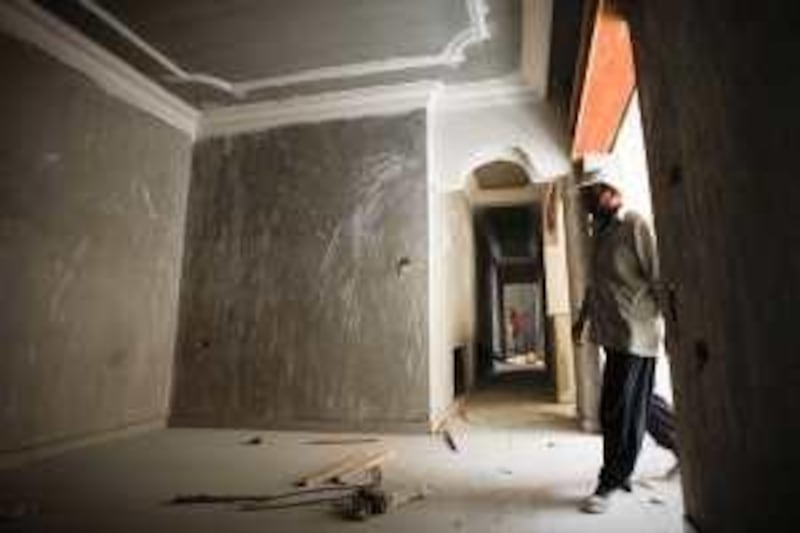AMMAN // For two years, Zahia Attallah and her husband Khamees have been trying to purchase their dream apartment in an upscale Amman neighbourhood. But so far, they have had no success, even though the budget they allocated for a three-bedroom apartment - US$310,000 (Dh1.1 million) - should have been enough.
Their search began in mid-2008 as reduced demand in Jordan's property market created a recession, and it was generally accepted that prices would fall sharply, fuelling hopes among would-be buyers. But like the Attallah's, many middle-class Jordanians who hoped to take advantage have been left disappointed. Jordan, a bastion of stability in a turbulent area, has attracted property investors from around the region, including Iraq and Lebanon, pricing local families out of the market. "We thought it was a good time to buy since everyone was talking about falling prices," Mrs Attallah, a mother of three, said. "But in reality we didn't see that happening. In the neighbourhoods we are looking for, prices remained roughly the same - $1,400 per one square metre."
Hopes they might be able to afford somewhere in the near future look bleak as demand in Jordan's property market has continued to rise. Figures from the department of land and survey showed that property deals in Jordan rose by 16 per cent to reach $2.1bn in the first quarter of this year compared to the same period of 2009. According to Reuters, Iraqis topped the list of non-Jordanian investors buying properties totalling 62.9 million dinars (Dh327m). They were followed by Lebanese, who purchased 5.6 million dinars worth of properties, and then holders of US passports - mostly Jordanian expatriates living abroad.
"Business is picking up. This is what we call natural growth," said Khaled Saudi, an estate agent who sells apartments and villas in western Amman. "The prices are not going to fall. "It is not easy for middle-class Jordanians to buy an apartment." What is contributing to the modest growth is a government measure taken last year to exempt the first 120 square metres from taxes. Moreover, a landlord and tenants law that is expected to take effect by the end of this year allows landlords to ask for higher rents, has also fuelled demand as tenants, worried that rents would soar, looked to buy their own homes. In the past, rents were capped for tenants who remained in the same property.
But for many middle-class Jordanians, home ownership is still beyond their reach. Since the financial crisis, banks became rigid in providing loans. Also inflation is climbing. Last month, it rose to 4.6 per cent in the first quarter of the year compared with the same period last year. Between 2004 and 2008, property prices in Jordan shot up tremendously, triggered in part by the oil boom in the Gulf that created a well of cash, and investors put their money in Jordan's property. Even expatriate Jordanians in the Gulf bought property in the kingdom. Banks in turn offered long-term housing loans with few restrictions.
The property sector also benefited from Jordan's reputation as a safe haven in a turbulent region, where demand from Lebanese, Palestinians and Iraqis contributed to the soaring prices. But as the financial crisis cast its dark shadow on the world's economy in 2008, the boom slowed down. "In the last two years, business was very slow," said Mr Saudi. "People bought only what they needed and did not purchase property for investment purposes."
Subsequently, the prices dropped but only between 10-15 per cent in affluent areas like Abdoun, Sweifyeh, Deir Ghbar and they hovered between $1,100-$1,700 per square metre. In eastern Amman, a lower income area, prices fell by up to 25 per cent, said Mr Saudi. "The drop was not as much as people were expecting," Imad Hmoud, an independent business analyst said. "There were speculations but the prices fell slightly, and it is a reality they have to deal with".
However, since the beginning of this year, the total value of property deal witnessed a modest increase compared with last year. smaayeh@thenational.ae





